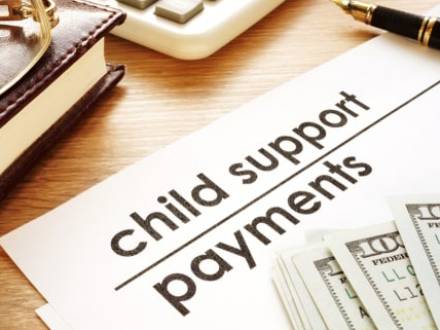Recent Blog Posts
What is a Contempt Proceeding After Divorce in Illinois?
 Once a court finalizes a divorce, the resulting settlement is an enforceable legal document. This means that the terms of the divorce agreement can be enforced under Illinois law. Violations of a divorce settlement, such as child visitation, property division, and alimony, are taken seriously by the court, so you have legal remedies if your ex-spouse breaks the agreement.
Once a court finalizes a divorce, the resulting settlement is an enforceable legal document. This means that the terms of the divorce agreement can be enforced under Illinois law. Violations of a divorce settlement, such as child visitation, property division, and alimony, are taken seriously by the court, so you have legal remedies if your ex-spouse breaks the agreement.
Van Larson Law, P.C., can assist you if your ex-spouse has violated your divorce agreement. Our Illinois divorce attorney has nearly 40 years of experience resolving many complex divorce cases involving enforcing agreements, child custody, child support, property division, etc.
What Happens if One Spouse Fails to Obey the Divorce Decree?
Sometimes, people refuse to pay child support, spousal maintenance, or follow the parenting plan for child visitation. If this happens, there are several options. The first step is usually a conversation; finding out why someone is out of compliance with a divorce decree and whether they can make changes may be all that is needed.
Do I Need an Order of Protection?
 Domestic violence and other forms of abuse are undoubtedly traumatic to live through. Sometimes, sufferers of domestic abuse may have a hard time coming to grips with their situation. And in many cases, abusers will manipulate their victims into believing that they are not suffering abuse at all. If you are questioning whether you are in an abusive relationship, an Illinois family law attorney can help you petition for an order of protection.
Domestic violence and other forms of abuse are undoubtedly traumatic to live through. Sometimes, sufferers of domestic abuse may have a hard time coming to grips with their situation. And in many cases, abusers will manipulate their victims into believing that they are not suffering abuse at all. If you are questioning whether you are in an abusive relationship, an Illinois family law attorney can help you petition for an order of protection.
At Van Larson Law, P.C., we have nearly four decades of experience handling complex, sensitive issues of family law. We can help you seek relief from domestic violence by collecting evidence for a long-term order of protection against an abusive partner or family member.
Physical Abuse
If you have ever been struck by a domestic partner, you have good reason to get an order of protection against him or her. Physical abuse can take other forms as well. If your partner puts you in fear of harm, such as punching a wall beside you or raising a fist, you can still petition for an emergency order of protection.
Can I Negotiate for More Alimony?
 If you are considering divorce in Illinois, you may be wondering whether you can negotiate for more alimony. Alimony is also known as spousal maintenance or spousal support and is meant to help a lower-earning or non-earning spouse maintain financial stability after divorce.
If you are considering divorce in Illinois, you may be wondering whether you can negotiate for more alimony. Alimony is also known as spousal maintenance or spousal support and is meant to help a lower-earning or non-earning spouse maintain financial stability after divorce.
Whether you can get higher payments depends on several factors, including your financial situation, the length of your marriage, and your spouse’s ability to pay. Before filing for divorce, make sure you understand the basics of Illinois alimony laws and meet with an Illinois divorce lawyer for specific advice.
The Basics of Alimony in Illinois
Spouses are encouraged to negotiate a property settlement, including alimony, that works for them both. If a divorcing couple can reach a fair settlement with which they both agree, a judge will probably approve it.
Illinois’s New Infant Drug Screen Laws and Child Custody
 As of January 1, 2025, Illinois mothers who give birth to infants who test positive for drugs will maintain their parental rights. Before this new law took effect, a mother could automatically lose her parental rights if her newborn tested positive for controlled substances. Hospitals are no longer required to report positive newborn drug screens to law enforcement, a policy that frequently resulted in new mothers being arrested or separated from their babies. Proponents of the law argue that it will encourage women with substance use disorders to seek treatment when they become pregnant, while opponents argue that the law fails to adequately protect infants born to drug-addicted mothers.
As of January 1, 2025, Illinois mothers who give birth to infants who test positive for drugs will maintain their parental rights. Before this new law took effect, a mother could automatically lose her parental rights if her newborn tested positive for controlled substances. Hospitals are no longer required to report positive newborn drug screens to law enforcement, a policy that frequently resulted in new mothers being arrested or separated from their babies. Proponents of the law argue that it will encourage women with substance use disorders to seek treatment when they become pregnant, while opponents argue that the law fails to adequately protect infants born to drug-addicted mothers.
However, one parent’s substance use problems or drug use during pregnancy could still have an impact on a child custody dispute between the child’s parents. A knowledgeable Kane County, IL child custody attorney should represent you if you are involved in a child custody case, especially if your child may be at risk due to the other parent’s drug use.
Tips for Divorce With a Blended Family
 When you are part of a blended family, getting divorced brings special challenges. Although there are children involved, some or all of them are not children of the marriage. If you or your spouse already had a child with someone else when you got married, you will not need to create a child custody plan for that child. Step-parents cannot compete for custody outside of very specific circumstances, such as when both of a child’s parents have passed away. However, during the time you were married, you likely both bonded with each other’s children. If you have a child with your current spouse, she may have bonded with her step-siblings. You can be left with a very complicated family situation going forward. An experienced Kane County, IL divorce attorney can help you create a plan and get any court orders you may need going forward.
When you are part of a blended family, getting divorced brings special challenges. Although there are children involved, some or all of them are not children of the marriage. If you or your spouse already had a child with someone else when you got married, you will not need to create a child custody plan for that child. Step-parents cannot compete for custody outside of very specific circumstances, such as when both of a child’s parents have passed away. However, during the time you were married, you likely both bonded with each other’s children. If you have a child with your current spouse, she may have bonded with her step-siblings. You can be left with a very complicated family situation going forward. An experienced Kane County, IL divorce attorney can help you create a plan and get any court orders you may need going forward.
What Can I Do if My Ex Misuses Child Support Funds?
 Child support is supposed to be used to provide for your child. The child support money you send to your co-parent should be used to buy your children clothes, food, school supplies, and other important things your child needs. If you suspect that your co-parent is using that money on non-essentials for himself or herself, you can take legal action. You may be able to request more parenting time so that you can support your children directly, especially if your child’s basic needs are not being met properly. You may also be able to ask the court to reduce your child support payments, especially if you are struggling to keep making them and your co-parent is clearly financially well-off. A knowledgeable Kane County, IL child support attorney can help you decide what steps to take.
Child support is supposed to be used to provide for your child. The child support money you send to your co-parent should be used to buy your children clothes, food, school supplies, and other important things your child needs. If you suspect that your co-parent is using that money on non-essentials for himself or herself, you can take legal action. You may be able to request more parenting time so that you can support your children directly, especially if your child’s basic needs are not being met properly. You may also be able to ask the court to reduce your child support payments, especially if you are struggling to keep making them and your co-parent is clearly financially well-off. A knowledgeable Kane County, IL child support attorney can help you decide what steps to take.
What Can Child Support Be Used For?
It is a common misconception that child support should benefit only the children and never the parent receiving it. In many cases, it is impossible for a parent to spend child support money in a way that does not benefit him or her at all but still adequately meets the child’s needs. For example, a parent who receives child support can reasonably use the funds to pay for a bigger apartment so that each child can have his or her own bedroom or move to a safer neighborhood that is better for the children to grow up in. While this use of child support funds certainly benefits the parent, it is also likely in the children’s best interests.
Modifying Child Custody Due to Neglect
 Just as your former spouse may have changed after you got married - which may have led to your divorce - he or she can continue to change after the marriage ends. Your formerly neat and tidy spouse might stop caring what the house looks like and allow conditions to become so unsanitary that your children are visibly dirty and wearing clothing that smells horrendous when you pick them up. Your formerly cautious spouse might get into a new relationship and start leaving your young children unattended to go out drinking. When you find that your children are no longer safe and well cared for when they are with your ex-spouse, it may be time to seek a modification to your child custody order so you can protect them. A Kane County, IL child custody lawyer can help you work towards a modification.
Just as your former spouse may have changed after you got married - which may have led to your divorce - he or she can continue to change after the marriage ends. Your formerly neat and tidy spouse might stop caring what the house looks like and allow conditions to become so unsanitary that your children are visibly dirty and wearing clothing that smells horrendous when you pick them up. Your formerly cautious spouse might get into a new relationship and start leaving your young children unattended to go out drinking. When you find that your children are no longer safe and well cared for when they are with your ex-spouse, it may be time to seek a modification to your child custody order so you can protect them. A Kane County, IL child custody lawyer can help you work towards a modification.
Why Calling DCFS Alone May Not Help
Calling the Department of Children and Family Services to report child neglect or abuse without filing for a change in custody may not produce the results you want. While your ideal outcome would be for DCFS to remove your children from your co-parent’s custody and place them with you, this is very unlikely.
Making School Choices After Your Divorce
 After months of back-and-forth and a measure of antagonism thrown in, you are finally divorced. Perhaps your children attended the public school closest to your home, but now you and your ex live in different places. One of you may want the children to go to the school in his or her district, while the other may disagree. Or perhaps one of you wants the children in a private school, and the other is stubbornly resisting. One parent could even want to homeschool, and the other could be adamantly opposed.
After months of back-and-forth and a measure of antagonism thrown in, you are finally divorced. Perhaps your children attended the public school closest to your home, but now you and your ex live in different places. One of you may want the children to go to the school in his or her district, while the other may disagree. Or perhaps one of you wants the children in a private school, and the other is stubbornly resisting. One parent could even want to homeschool, and the other could be adamantly opposed.
Whatever the issue, when you and your ex share parental responsibilities, an agreement must be reached. If you and your ex simply cannot agree, the Judge can make special provisions based on the children's best interests. However, the decision may be more difficult, even for a Judge, when it comes to private school or homeschooling. Before you give up and turn the matter over to a Judge, consider the value that an experienced Batavia, IL parental responsibilities attorney can bring to the negotiation table.
How Is Intellectual Property Divided in a Divorce?
 Property division is a challenging part of the divorce process. It is a complex procedure in which marital assets — meaning those possessions acquired by either spouse during the marriage — are accounted for and distributed between the parties. In Illinois, since marital assets are divided fairly instead of equally, it is up to a judge to divide the marital estate as he or she sees fit.
Property division is a challenging part of the divorce process. It is a complex procedure in which marital assets — meaning those possessions acquired by either spouse during the marriage — are accounted for and distributed between the parties. In Illinois, since marital assets are divided fairly instead of equally, it is up to a judge to divide the marital estate as he or she sees fit.
Dividing marital property can become even more complex depending on the value and nature of the assets. Real estate, for example, must be valued and distributed. A family business also must be valued, which is done using one of several approaches. Intellectual property is another asset that can be challenging to divide in a divorce.
This article will discuss what intellectual property is, how it is distributed between divorcing parties, and how to seek the help of an Illinois divorce attorney for the property division process.
Can a Divorced Mom Homeschool Her Children in Illinois?
 Homeschooling has become an increasingly popular educational choice for families across Illinois. It offers flexibility and personalized learning experiences that are tailored to your child and can suit your schedule. However, since homeschooling is not a typical school setting and it is a major commitment for parents, it is a decision that should be made collaboratively. For parents navigating custody agreements and parenting plans after a divorce, homeschooling can raise unique legal questions and considerations. If you are divorced and feel that homeschooling is the best option for your child, speak with a Kane County, IL family law attorney who can help you navigate this complicated situation.
Homeschooling has become an increasingly popular educational choice for families across Illinois. It offers flexibility and personalized learning experiences that are tailored to your child and can suit your schedule. However, since homeschooling is not a typical school setting and it is a major commitment for parents, it is a decision that should be made collaboratively. For parents navigating custody agreements and parenting plans after a divorce, homeschooling can raise unique legal questions and considerations. If you are divorced and feel that homeschooling is the best option for your child, speak with a Kane County, IL family law attorney who can help you navigate this complicated situation.
Custody and Decision-Making Authority
Custody arrangements in Illinois typically include agreements about which parents have the authority to make decisions about their child’s education, among other things. If one parent wishes to homeschool, it is important to review the custody agreement to see who has the authority to make educational decisions. If the parents share decision-making authority, they both need to agree about the decision to homeschool. If one parent has sole decision-making authority, they can make educational choices without the other parent's consent.
-
-
Location
233 W. Wilson Street
Batavia, IL 60510Mon – Fri: 8AM – 5PM
Weekends and evenings by appointment. All phone calls and emails promptly and personally responded to and advise if emergency.Phone: (630) 879-9090
-
Contact us
NOTE: Fields with a * indicate a required field.****
-




